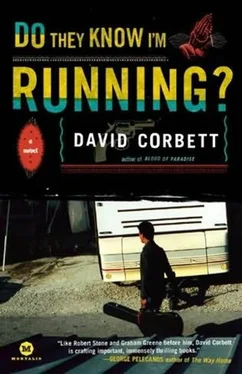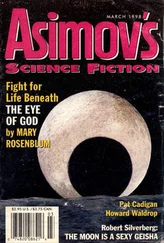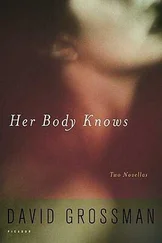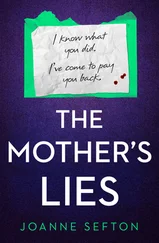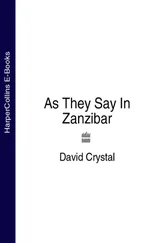“Don’t talk like this.”
“I’ll talk as I please, mister. I’ve earned that much.”
“I can’t leave you here, not like this.”
“You have to leave me here. And yes, just like this. Now go.”
“Promise me.”
“I promise. Go.”
He didn’t dare search her eyes, fearing the lie he would find there. But she was stronger than him and he knew the only thing talk would accomplish would be the wasting of more time. He needed to spare her conscience. He needed to get those two kids somewhere far away.
“I’ll be back soon as I’m able.”
“You come back as soon as it’s right.”
He leaned down, kissed her again, lingered-she closed her eyes, the lids webbed with thin blue veins-then left hurriedly, not looking back. Out in the garage he pulled open the roll-up door and squinted against the light, then eased behind the wheel of the station wagon. “My brother-in-law runs this motel near the airfield in Tucson.” He cranked the ignition, tugged the gearshift into drive. “You’ll be safe there till your aunt comes.”
“TOLD YOU,” IRETON SAID, TAPPING HIS PEN AGAINST THE STEERING wheel. His other hand held the binoculars. “And it didn’t take long.”
They were hidden from view, parked on a rise, nestled in a shallow red-rock gulley scruffed with mesquite and cholla. Lattimore watched as the station wagon clipped past on the two-lane road below, heading north toward Tucson.
“Someone in the passenger seat too,” Ireton said, “not the wife. A man or boy. Plus a third person, lying down in back. Learn more when we pull them over.”
Lattimore tracked the path of the car, thinking: a boy. Most likely the kid brother, Roque. Somehow he’d survived, made it over. With a girl in tow.
They’d found Happy’s body yesterday outside Naco, sprawled below a scarp of rock, like somebody’d shot him out of the sky. The coyotes didn’t improve things. Lattimore had tried to keep a handle on himself, project a stern remove as the Mexican forensics crew waved off the flies, probing the corpse for its secrets, but he remembered the edgy young man who couldn’t get down even a mouthful of soup in the Vietnamese restaurant that rainy day. Probably the worst CI ever, he thought, which was a kind of testament, snitches being what they are. He thought as well of the woman, Élida-Lucha, her family called her, tough old bird, had to admire that. Just a few days ago, she’d had a family. Now, maybe, she had a nephew. And his fate was hardly enviable.
As for the girl, she was a singer, or so McIlvaine said, one last tip, surprisingly low-key. He seemed rankled by the ungodly spin the Mexicans were putting on Samir’s death-terrorist my ass, words to that effect-but like the bureau, he and the Banneret group, whoever the hell they were, saw no percentage in exposing the sideshow for what it was. Let it go, he told himself, walk away, everyone involved in this mess had an angle. The world as it is. The things you don’t know about what happened the past few weeks would no doubt fill a very fat book.
Exhibit A: Andy McIlvaine. He’d predictably gone cagey as to where or how he’d come across his info on the girl but she was some sort of tribute from the Salvadoran mareros to Don Pato, the gangster who ran this stretch of the Arizona line. Which meant Roque was a marked man. Killers are sentimental. They remember the gifts they’ve been promised, none more so than the ones that never show up.
There was just one last thing to take care of then. Lattimore wished he could find some way to feel better about it.
They’d done a net-worth analysis on all the agents out of the Douglas Station. Ireton’s ex-wife had inexplicably come into some very valuable property around Lake Havasu. Interesting thing about ex-wives, even the ones still friendly. Forced into a corner, they tended to talk.
Ireton put the binoculars down. “Let’s wrap this up.” He reached for the gearshift.
Lattimore, getting there first, lodged it in place. “Tell you the truth,” he said, “I’m a lot more interested in this call you got from across the border than I am in following that wagon.”
THEY RODE IN SILENCE, NOTHING BUT THE RUMBLE OF THE MOTOR AND the hum of the tires against the pavement, the crush of the desert wind. Lyndell’s eye traveled from the road to the speedometer to his mirrors, making sure he did nothing to encourage a restless cop hoping for a pull-over. Occasionally the boy, Roque, glanced over his shoulder at the girl and a couple times he reached out his hand, she took it, and they rode like that for a while, no words between them.
Sometimes, out of the corner of his eye, Lyndell caught the boy’s expression and saw such devotion there, he felt humbled. His mother, his uncle, his cousin the badass, his brother the war hero-the boy had lost them all. And yet look at him. Maybe that was the key. Was there a way to know love, he wondered, before you understood death? So much of life seemed like a rush to get elsewhere. He felt small-only now, with Audrey so near the end, did he really get it. How much time did I waste, he wondered, because I thought there was a way out?
Out of nowhere, the boy said, “Your wife, she reminds me of my aunt.” He sat with that a second, studying the desert. “I owe her, my aunt I mean. Same way I owe you and your wife.”
Lyndell spotted a red-tailed hawk soaring low over the sunlit bluffs. A feeling like envy came over him: to be free like that, to fly. “Forget about owing us anything.”
“I won’t forget.” Again, he reached back for the girl’s hand. “I’m not just saying that.”
AT THE MOTEL IN TUCSON, LYNDELL SPOKE BRIEFLY WITH CHET, Audrey’s sister’s husband. The place was timeworn but clean, a pre-freeway relic used mostly now by families visiting someone at the air force base. Chet had inherited the motel from his mother’s people. He was a soft pale man with an ample face ruined by drink then reclaimed by Jesus. He’d already gotten a call from Audrey, knew the situation. “Don’t know what’s gotten into you two.” He said it in a whisper though no one was there to overhear, handing over the room key. “But if somebody’s gonna call the law, ain’t gonna be me. Too damn old to find new kin.”
“They won’t be trouble,” Lyndell said. “They’ll stay in the room till the aunt shows up, should be late tomorrow. I’d stick around myself, make sure it all goes okay, but I want to get back.” He had a hard time getting that last bit out. He breathed in deep, then added, “You know.”
Chet shook his head, his eyes a sorrow in themselves. “I can’t hardly imagine.”
“Yeah. Well.” Lyndell coughed into his fist. “The girl out there in the car, she’s not in too good shape, neither.”
“What if she needs doctoring?”
Lyndell shook his head. “She should be okay. If not, it’s not your problem, go ahead and call 911. Only so much you can do.”
Chet glanced up at the TV perched over the reception desk. “Roger that.”
Lyndell returned to the car, helped the boy get the girl up and out of the backseat, let them into their room. The door was pitted from years of windblown sand. Inside, the raw ammonia smell hung like a pall. The girl walked as though the pain was holding her up and plowed straight for the bed, collapsed onto the edge, then shamefacedly refused to lie down, sitting there, panting, eyes closed. Proud. The boy stood there, waiting for her to say something, tell him what she needed. Look at us, Lyndell thought, two men, a lifetime between us, both so damn helpless.
He stirred himself into motion. “Lie low till your aunt gets here,” he told Roque, turning on the bedside lamp, fussing the curtains closed. “You’ll get no trouble from Chet.” He found it hard to look at the girl, too much like looking at Audrey. “There’s a market just up the road, get yourself some food or drinks. But I’d stay inside as much as possible, I were you.” He stood there a moment, feeling weighed down, then: “I need to get back.”
Читать дальше
